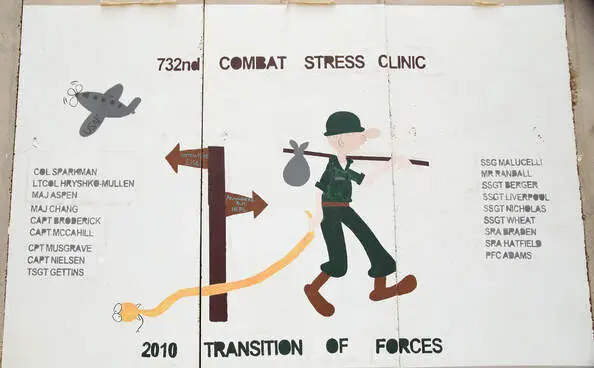Written by Helen Frazier

We’ve spoken at length about the power of art to treat traumatized veterans. Nor are we the only ones to appreciate art’s potential in this arena. However, what works for some may well not work for others – particularly when it comes to something as complex and individualized as Post-Traumatic Stress Disorder. The VA and the government tend to stick strictly to evidence-based medicine when recommending PTSD treatments (and why should they not?). However, their facilities for actually providing these treatments are sadly lacking – due largely to overwhelming demand. Do not despair, though. If art therapy is not helping you to heal, and you’re struggling to get conventional treatment, there are other options out there. Here are just a few ideas which may help you.
Yoga and meditative practices are becoming widely accepted as treatments – even in famously conservative military circles. So much so that you may actually find that you’re covered for it if your yoga/meditation treatment comes from a recognized provider. While it doesn’t work for everyone, an astonishing number of suffering people have said that they found their symptoms diminished and their quality of life considerably improved by yoga and/or meditation. How can this be? Well, yoga and meditation help people to break negative or traumatic thought cycles. Yoga in particular can force the brain to quit worrying and relax. It does this by essentially working backwards from body to mind. By deliberately inducing symptoms of calm in the body – i.e. steady breathing, a relaxed heartbeat, smooth movements – the body sends signals to the brain that everything is absolutely fine and it can calm down. It sounds counter-intuitive, but it works. Meditation has a similar effect. What is more, both yoga and meditation can send the brain into a ‘safe space’ – a calm, unpressured level of thought in which negative emotions and experiences can be processed by the psyche without excess trauma being expressed through the consciousness. Needless to say, this can contribute enormously to the healing process.


There are several charities out there which are pioneering the use of assistance dogs for those with PTSD. Animals – dogs in particular – are known to be good for the mental health of those who love them. On one level, interacting with and being responsible for an animal gives one a sense of purpose. They also bestow pride, give companionship, allow the expression of love (which many traumatized individuals struggle with), draw out emotions, help communication, soothe stress and much more. The simple act of stroking a pet can lower both your stress levels and your blood pressure. In addition to these benefits, trained PTSD assistance dogs can aid their masters in more specific ways. Hypervigilance, for example, can be put on hold if the patient knows that their dog is there to take on some of that burden. Furthermore, dogs can be trained to recognize their owners ‘triggers’ and either warn their owners or those around them of an impending PTSD situation. According to many sources, these dogs do an awful lot of good.
While the practice of sticking needles in someone to alleviate their troubles may sound dubious, acupuncture actually appears surprisingly effective in treating PTSD. Further trials are certainly needed in order to scientifically establish the efficacy of acupuncture in this field, but experiential evidence is generally positive.The scientific and spiritual theories behind acupuncture are too complex to go into here, but (put very basically) acupuncture is supposed to alter and smooth the flow of both liquids and more ephemeral forces around the body. It’s certainly been proven to have an effect upon the circulation, and may improve blood flow to the brain – something which could be of enormous help for those with mental trauma. On a less cellular level, acupuncture is also very soothing. It’s generally acknowledged to help patients to sleep deeply and well, which is in itself an immensely healing process. It will also fight stress, and help the patient to relax. Crucially, it can help the patient to reconnect with their own vulnerabilities, to accept them, and to trust. For those who have suffered mental trauma following combat, this can be invaluable.

Delivered by FeedBurner





Founder and CEO of The Graffiti of War Project, Doc is a decorated combat veteran of Operation Iraqi Freedom where he was a combat medic with the 54th Engineer Battalion. He is currently the a journalist for Force 12 Media and is featured weekly on SOFREP.com. Docas been featured in numerous media outlets such as Wired.com, Maxim.com and BusinessInsider.com. For more information about Jaeson “Doc” Parsons click HERE or send him an EMAIL.
RSS Feed
April 2023
March 2023
October 2020
June 2019
December 2018
November 2018
November 2016
April 2016
March 2016
February 2016
April 2015
May 2014
April 2013
October 2012
July 2012
December 2011
October 2011
September 2011
August 2011
July 2011
June 2011
May 2011
April 2011
March 2011
February 2011
January 2011
December 2010
November 2010
October 2010
July 2010
May 2010
April 2010
Copyright 2024 – The Graffiti of War Project